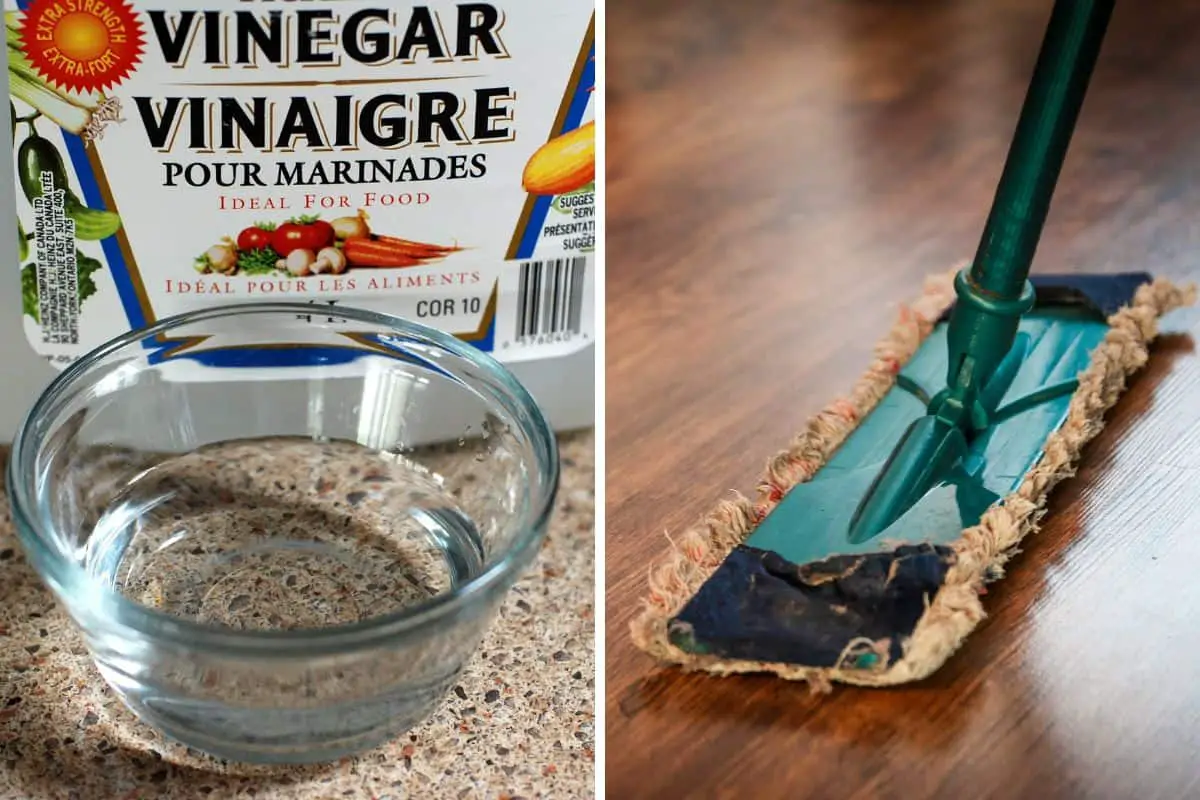Are you looking for a way to get some extra cleaning power out of your steam mop and make your floors shine? If so, you might be thinking of adding vinegar, a common cleaning product – but is it safe to do this?
Vinegar is fine to add to a steam mop, and it will help to sterilize the environment that you are cleaning, getting rid of germs and bacteria. A lot of people like using vinegar to clean because it is natural, environmentally friendly, and inexpensive. However, you do need to be careful which materials you use it on.
Is It Safe To Put Vinegar In A Steam Mop?
A lot of people put vinegar in their steam mops, and the great news is that this will not hurt your mop at all. You can use it to sterilize a whole variety of surfaces. The steam of your mop is already excellent for sterilization, but when this is combined with the power of the vinegar, you can be sure you are removing all the germs from your floors.
However, there are a few things to be careful about. You should make sure that the surface you plan to use the vinegar on is safe and suitable. If you are cleaning an unsealed hardwood floor, for example, the vinegar will ruin it. It will destroy the chemical finish on the floor, which is there to protect the wood from damage.
Once you’ve added vinegar and this finish has gone, there is nothing to stop the floor from being spoiled, so it’s crucial not to do this. You should always check whether the surface is vinegar-safe before you use a steam mop filled with vinegar on it.
Which Surfaces Are Safe?
There are many surfaces that you can use vinegar on without having to worry. It is always a good idea to check a small area first, however, so you know for sure that your efforts are not going to destroy the flooring. You can run the cleaner over a small, localized area of the floor to make sure it doesn’t affect the surface.
In general, you can safely use vinegar on sealed hardwood floors, vinyl, carpets, and linoleum. If you aren’t sure, research your specific flooring type or get in touch with the manufacturers.
Tiles are generally okay, but vinegar should not be used on porous tiles. As stated by FantasticServicesGroup, marble, granite, and terracotta tiles may not respond well to vinegar, as the acid will get into the tile and may damage its surface. It should be fine to use vinegar on porcelain or ceramic tiles, however.
Don’t put any vinegar on an unsealed hardwood floor, as it will cause the wood to swell, destroy the luster, and generally ruin the appearance of the floor. You should clean unsealed hardwood flooring according to the manufacturer’s instructions.
We have an unsealed hardwood floor in our home, and it’s a nuisance to clean. We can’t really sterilize it, and have considered getting it sealed. In the meantime, we use soft brushes, clothes, and specifically designed cleaning products to keep it looking nice. We don’t use our steam mop on it, with or without vinegar.
How Do You Add Vinegar To A Steam Mop?
If you want to use vinegar in a steam mop, you should:
- Mix 2 cups of white vinegar and 2 cups of water, along with 2 cups of alcohol. Stir them together.
- Add a small squeeze of dish detergent to the mix.
- Stir this up thoroughly, and then pour it into the steam mop’s water tank.
Don’t put neat vinegar in your steam mop. It is too strong and may damage the surface you are cleaning, even if diluted vinegar would be safe. You need to mix the vinegar with water if it’s going to be safe to use.
You should also avoid buying strong, commercial vinegar. This is unnecessary. Household vinegar will work fine for disinfecting surfaces. Most vinegar is between 4 and 7 percent, and this should be perfect for household use.
Will Vinegar Make A Steam Mop Work Better?
A lot of manufacturers actually recommend putting vinegar in your steam mop in order to descale it. Tap water generally contains calcium carbonate, and this builds up into a flaky, chalky substance commonly referred to as limescale. This is gradually deposited on the insides of any appliances that use water.
You may have seen this in your kettles, toilets, and dishwasher, especially if you live in an area with hard water. It will stop the appliances from working efficiently, so it’s a good idea to get rid of it. Fortunately, vinegar helps to clear it.
Putting vinegar in the mop is therefore a great way to tackle limescale both inside and outside the appliance, and it can be part of your regular cleaning routine.
How Do You Use A Vinegar Steam Mop On Carpet?
You may not be familiar with using your steam mop on carpet, let alone with vinegar in it, but this is a great way to get it clean and to kill off any germs that may be lurking in the fibers. To do this, follow the method below:
- Prepare your vinegar solution as described above.
- Add a little bicarbonate of soda to the solution and transfer it to the water tank.
- Use the steam mop on the carpet, cleaning the whole area.
That’s really all that there is to it!
How Do You Use A Vinegar Steam Mop On Tiles?
If you want to use a steam mop on tiles, this is easy too. First, make sure that the tiles are non-porous so vinegar won’t damage them. If you aren’t sure, do not use vinegar in the steam mop, as your normal steam cleaner will get the tiles pretty clean, and it’s better not to take the risk.
If your tiles are non-porous, you should:
- Mix the vinegar solution as described above.
- Tip the solution into the water tank.
- Use the steam cleaner to clean the tiles, paying particular attention to the grout. It should help to lift any dirt out of these areas, leaving them looking clean and fresh again.
It is important to note that some tile manufacturers recommend you do not use vinegar on their products or on the grout between the tiles. This is because it is an acidic substance, and it will very gradually wear the tiles down, just as it will wear any surface down.
However, this is true of all cleaning methods, and as long as you are diluting the vinegar sufficiently, it should be safe to use it on the tiles. You should make this a rare occurrence, and avoid adding vinegar every time you clean your tiles.
Can You Add Any Products To Your Steam Mop?
Before you add anything, even vinegar, it is a good idea to consult the steam mop’s manual or check with the manufacturer. Most steam mops – if not all – will not be damaged by adding vinegar to them. However, it is still important to check.
Some steam mops say that you should only use water in them, and in these cases, it is best to avoid adding vinegar. Although it may not hurt the mop, you could invalidate the guarantee on the machine. Stick to water if this is what the manufacturer suggests.
What Are The Benefits Of Adding Vinegar To A Steam Mop?
Most people who add vinegar to their mops do so for extra cleaning power – but what does this really mean? Here are a few things that vinegar does.
Stain Remover
Steam mops are rarely effective against stains. Their purpose is to apply very hot water to the surface, and that means they aren’t particularly good at getting rid of stains. They might be able to shift a few light marks, but on the whole, they are about disinfecting.
Vinegar, however, can be quite good at tackling stains. This is because the acidity will break down whatever has caused the stain, making it easier for the mop pad to pick up the particles and remove them.
We have used vinegar to get marks off our tile floors at times, and it makes a surprising amount of difference. It isn’t like using a commercial stain remover, but it’s pretty effective and I would definitely recommend giving it a go.
Disinfectant
Obviously, one of the biggest attractions of vinegar is its ability to kill germs. You can get rid of all kinds of bacteria with vinegar and a steam cleaner combined. It is nice knowing that your floor has been sterilized in a way that is natural.
Environmentally Friendly
Another major attraction is that vinegar is safe for the environment. You won’t be adding lots of chemicals to your home, and it’s not dangerous to pets or children. Vinegar is probably one of the most powerful natural cleaners that there is. Of course, it doesn’t smell great, but this scent will soon dissipate.

